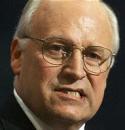Come you masters of war
You that build all the guns
You that build the death planes
You that build the big bombs
You that hide behind walls
You that hide behind desks
I just want you to know
I can see through your masks
Jus ad bello
Like Judas of old,
you lie and deceive
A world war can be won
you want me to believe
But I see through your eyes
And I see through your brain
Like I see through the water
That runs down my drain
Senator Bob Smith (R-NH), Republican Party fund-raiser, 12 April 2002:
Why don’t we just take his oil?
Smith bellowed to the crowd
during a fiery 13-minute speech, referring to Iraqi dictator Saddam
Hussein. Why buy it? Take it!
President George W. Bush, speech before the United Nations General Assembly, 12 September 2002:
He has proven instead only his contempt for the United Nations, and for all his pledges. By breaking every pledge — by his deceptions, and by his cruelties — Saddam Hussein has made the case against himself.
…
In 1991, the Iraqi regime agreed to destroy and stop developing all weapons of mass destruction and long-range missiles, and to prove to the world it has done so by complying with rigorous inspections. Iraq has broken every aspect of this fundamental pledge.
From 1991 to 1995, the Iraqi regime said it had no biological weapons. After a senior official in its weapons program defected and exposed this lie, the regime admitted to producing tens of thousands of liters of anthrax and other deadly biological agents for use with Scud warheads, aerial bombs, and aircraft spray tanks. U.N. inspectors believe Iraq has produced two to four times the amount of biological agents it declared, and has failed to account for more than three metric tons of material that could be used to produce biological weapons. Right now, Iraq is expanding and improving facilities that were used for the production of biological weapons.
United Nations’ inspections also revealed that Iraq likely maintains stockpiles of VX, mustard and other chemical agents, and that the regime is rebuilding and expanding facilities capable of producing chemical weapons.
…
We know that Saddam Hussein pursued weapons of mass murder even when inspectors were in his country. Are we to assume that he stopped when they left? The history, the logic, and the facts lead to one conclusion: Saddam Hussein’s regime is a grave and gathering danger. To suggest otherwise is to hope against the evidence.
Perry G. Smith, guest column for the Opelika-Auburn News, 27 February 2003:
The editorial board asked these questions:
How can we start a war with Iraq while waging a war against terrorists all over the place?
Would the battlefront be too much to manage?
Might al-Qaida appreciate us going into Iraq?
If we attack Iraq, will we be more vulnerable to terrorists?
It’s too bad those people whom we elected to make decisions about those questions for us (President Bush, Vice President Chaney [sic] and our Republican-controlled Congress) and our nation’s National Security advisers and military leaders don’t include the [Opelika-Auburn News] on every little aspect of their planning. Our smart leaders use intelligence that is gathered by very sophisticated sources in their decision-making process. Disclosure of our secret intelligence and plans (necessarily the answers to your questions) to the liberally biased news media usually gets the people who gave the information on which we based our decisions killed or stops any further disclosure of information to our sources. I believe that our leaders have made a full assessment of those and other questions and the best courses of action have been decided upon for the best interest of our nation. All of us should fall in behind our president and whole-heartedly support him and our committed military personnel now.
…
Saddam needs to disarm now. If he does not, this superpower intends to make him. I personally believe that this conflict will be over more quickly than Desert Storm and with even fewer U.S. casualties.
Jus in bello
You fasten the triggers
For the others to fire
Then you set back and watch
When the death count gets higher
You hide in your mansion
As young people’s blood
Flows out of their bodies
And is buried in the mud
George W. Bush, 20 January 2002:
I, GEORGE W. BUSH, … do hereby proclaim Sunday, January 20, 2002,
as National Sanctity of Human Life Day. I call upon all Americans
to reflect upon the sanctity of human life. Let us recognize the
day with appropriate ceremonies in our homes and places of worship,
rededicate ourselves to compassionate service on behalf of the weak
and defenseless, and reaffirm our commitment to respect the life
and dignity of every human being.
Alberto Gonzales, memo to George W. Bush, 23 January 2002:
Positives
The consequences of a decision to adhere to what I understood to be your earlier determination that the GPW does not apply to the Taliban include the following:
…
- Substantially reduces the threat of domestic criminal prosecution under the the War Crimes Act (18 U.S.C. 2441).
** That statute, enacted in 1996 prohibits the commission of a
war crime
by or against a U.S. person, including U.S. officials. War crime
for these purposes is defined to include any grave breach of GPW or any violation of common Article 3 thereof (such as outrages against personal dignity). Some of these provisions apply (if the GPW applies) regardless of whether the individual being detained qualifies as a POW. Punishments for violations of Section 2441 include the death penalty. A determination that the GPW is not applicable to the Taliban would mean that Section 2441 would not apply to actions taken with respect to the Taliban.
Secretary of Defense Donald Rumsfeld, meeting with troops in Qatar, 28 April 2003:
And there have not been large numbers of civilian casualties
because the coalition took such great care to protect the lives of
innocent civilians as well as holy sites. … When the dust is
settled in Iraq, military historians will study this war. They’ll
examine the unprecedented combination of power, precision, speed,
flexibility and, I would add also, compassion that was employed.
General Tommy Franks, Bagram Air Force Base, 19 March 2002:
I don’t believe you have heard me or anyone else in our leadership
talk about the presence of 1,000 bodies out there, or in fact how
many have been recovered. You know we don’t do body counts.
Donald Rumsfeld, interview on FOX News Sunday, 9 November 2003:
Well, we don’t do body counts …
British Foreign Secretary Jack Straw, interview with BBC Today, 18 May 2004:
Q: How many people, Iraqi people, have been killed during the occupation? Do you have a figure or don’t you?
A: … And I gave answers to a Parliamentary Question on this. I
went into it in a great deal of detail. We’ve made use of NGO
estimates, and others, but the last estimate which I gave in answer
to a Parliamentary Question, and I speak from recollection but I’m
happy to have this checked, was about ten thousand.
Hamza Hendawi, Associated Press, 7 September 2004:
A spike in fighting with Sunni and Shiite insurgents killed eight
Americans in the Baghdad area on Tuesday and Wednesday, pushing the
count to 1,003. That number includes 1,000 U.S. troops and three
civilians, two working for the U.S. Army and one for the Air Force.
The tally was compiled by The Associated Press based on Pentagon
records and AP reporting from Iraq.
Defense Secretary Donald H. Rumsfeld cited progress on multiple
fronts in the Bush administration’s global war on terrorism and
said U.S. enemies should not underestimate the willingness of the
American people and its coalition allies to suffer casualties in
Iraq and elsewhere.
Dr. Les Roberts, 29 October 2004:
Making conservative assumptions we think that about 100,000 excess
deaths, or more, have happened since the 2003 invasion of Iraq.
Violence accounted for most of the excess deaths and air strikes
from coalition forces accounted for most of the violent deaths.
James Massey, interview on Democracy Now!, 24 May 2004:
Iraq violated every rule of engagement that I have ever been taught
– violated every rule of the Geneva Convention that I have been
taught.
Adam Gorlick, Associated Press, 16 October 2004:
Depression set in, and Jeff dealt with it by going on heavy
drinking binges. On Christmas Eve, he sat down with Debbie and gave
his first account of being told to shoot two unarmed Iraqi
soldiers.
The way he told the story, Jeff was about five feet away from two
Iraqis — each about his own age — when he was ordered to shoot
them. He said he looked them in their eyes before closing his own,
then pulled the trigger.
He took off two dog tags around his neck, threw them at me and
said, Don’t you understand? Your brother is a murderer,
Debbie said.
Doug Struck, Washington Post, 7 December 2004:
A former U.S. Marine staff sergeant testified at a hearing Tuesday that his unit killed at least 30 unarmed civilians in Iraq during the war in 2003 and that Marines routinely shot and killed wounded Iraqis.
Jimmy J. Massey, a 12-year veteran, said he left Iraq in May 2003 after a diagnosis of post-traumatic stress. He said he and his men shot and killed four Iraqis staging a demonstration and a man with his hands up trying to surrender, as well as women and children at roadblocks. Massey said he had complained to his superiors about the killing of innocent civilians,
but that nothing was done.
U.S.-appointed Iraqi Defence Minister Sheikh Hazem Shalaam, 9 November 2004:
We’ve called it Operation Dawn. God willing, it’s going to be a
new, happy dawn for the people of Falluja.
U.S. defense official, speaking on condition of anonymity, 9 November 2004:
There is no confusion, if you’re on the street, you’re a bad guy.
Ninety per cent of the civilian population has left
Rory McCarthy and Peter Beaumont, The Guardian:
The moves came amid renewed warnings from aid groups that Iraq’s
civilian population was facing a humanitarian catastrophe
.
Although many of Falluja’s 200,000 to 300,000 residents fled the
city before the assault, between 30,000 and 50,000 are believed to
have remained during the fighting.
The horrific conditions for those who remained in the city have
begun to emerge in the last 24 hours as it became clear that US
military claims of precision
targeting of insurgent positions
were false.
According to one Iraqi journalist who left Falluja on Friday, some
of the civilian injuries were caused by the massive firepower
directed on to city neighbourhoods during the battle.
If the fighters fire a mortar, US forces respond with huge
force,
said the journalist, who asked not to be named.
The city had been without power or water for days. Frozen food had
spoiled and people could not charge their cellphones. Some
people hadn’t prepared well. They didn’t stock up on tinned food.
They didn’t think it would be this bad,
he said.
At the main hospital, cut off from the rest of the city, doctors
have reportedly been treating the injured with nothing but
bandages, while the Red Crescent says people have been bleeding to
death for lack of medical attention.
Secretary of Defense Donald Rumsfeld, meeting with troops in Qatar, 28 April 2003:
Q: Hi, Mr. Secretary. I’m Sergeant Cramer (ph) from the 502nd
(Transit ?), and I was just curious to know whether or not you’ve
been bombarded with apologetic phonecalls from your critics who had
perceived a doom and gloom scenario.
(Applause; cheers.)
Rumsfeld: My answer’s off the record. (Laughter.) There were a lot
of hand-wringers around, weren’t there? (Laughter; applause.) You
know, during World War II, I think Winston Churchill was talking
about the Battle of Britain, and he said, Never have so many owed
so much to so few.
A humorist in Washington the other day sent me
a note paraphrasing that, and he said, Never have so many been so
wrong about so much.
(Laughter; applause.)
Jus post bellum
How much do I know
to talk out of turn?
You might say that I’m young
You might say I’m unlearned
But there’s one thing I know
Thought I’m younger than you
Even Jesus would never forgive what you do
George W. Bush, remarks to reporters, 3 May 2003:
We’ll find them [Weapons of Mass Destruction]. It’ll be a matter of time to do so
George W. Bush, interview with TVP Poland, 30 May 2003:
But for those who say we haven’t found the banned manufacturing devices or banned weapons, they’re wrong, we found them.
U.S. Defense Secretary Donald Rumsfeld, 10 February 2004
WASHINGTON (AFP) – US Defense Secretary Donald Rumsfeld said he did not recall British Prime Minister Tony Blair’s pre-war claim that Iraq had weapons of mass destruction ready to be deployed in 45 minutes.
I don’t remember the statement being made, to be perfectly honest,
Rumsfeld told a Pentagon news conference.
General Richard Myers, the chairman of the Joint Chiefs of Staff, said he didn’t remember the statement either.
The claim made headlines around the world after Blair leveled it in a 55-page white paper
presented to the House of Commons in September 2002.
Paul Bremer, Coalition Provisional Authority, 2 September 2003:
The Iraqi people are now free. And they do not have to worry about
the secret police coming after them in the middle of the night, and
they don’t have to worry about their husbands and brothers being
taken off and shot, or their wives being taken to rape rooms. Those
days are over.
George W. Bush, press availability in Monterrey, Mexico, 12 January 2004:
One thing is for certain: There won’t be any more mass graves and
torture rooms and rape rooms.
Maj. Gen. Antonio M. Taguba, report to Lieutenant General Ricardo S. Sanchez, 11 March 2004:
On 19 January 2004, Lieutenant General (LTG) Ricardo S. Sanchez,
Commander, Combined Joint Task Force Seven (CJTF-7) requested that
the Commander, US Central Command, appoint an Investigating Officer
(IO) in the grade of Major General (MG) or above to investigate the
conduct of operations within the 800th Military Police (MP)
Brigade. LTG Sanchez requested an investigation of detention and
internment operations by the Brigade from 1 November 2003 to
present. LTG Sanchez cited recent reports of detainee abuse.
…
I find that the intentional abuse of detainees by military police personnel included the following acts: (a) Punching, slapping, and kicking detainees; jumping on their naked feet; (b) Videotaping and photographing naked male and female detainees; (c) Forcibly arranging detainees in various sexually explicit positions for photographing; (d) Forcing detainees to remove their clothing and keeping them naked for several days at a time; (e) Forcing naked male detainees to wear women’s underwear; (f) Forcing groups of male detainees to masturbate themselves while being photographed and videotaped; (g) Arranging naked male detainees in a pile and then jumping on them; (h) Positioning a naked detainee on a MRE Box, with a sandbag on his head, and attaching wires to his fingers, toes, and penis to simulate electric torture; (i) Writing I am a Rapest
(sic) on the leg of a detainee alleged to have forcibly raped a 15-year old fellow detainee, and then photographing him naked; (j) Placing a dog chain or strap around a naked detainee’s neck and having a female Soldier pose for a picture; (k) A male MP guard having sex with a female detainee; (l) Using military working dogs (without muzzles) to intimidate and frighten detainees, and in at least one case biting and severely injuring a detainee; (m) Taking photographs of dead Iraqi detainees. … These findings are amply supported by written confessions provided by several of the suspects, written statements provided by detainees, and witness statements.
…
Several US Army Soldiers have committed egregious acts and grave breaches of international law at Abu Ghraib/BCCF and Camp Bucca, Iraq. Furthermore, key senior leaders in both the 800th MP Brigade and the 205th MI Brigade failed to comply with established regulations, policies, and command directives in preventing detainee abuses at Abu Ghraib (BCCF) and at Camp Bucca during the period August 2003 to February 2004.
Then-National Security Advisor Condoleeza Rice, CBS Early Show, 19 March 2004:
There are no more rape rooms and torture chambers in Iraq.
George W. Bush, remarks on the first anniversary of the Iraq War, 19 March 2004:
All of us can now agree that the fall of the Iraqi dictator has
removed a source of violence, aggression and instability in the
Middle East. … Who would prefer that Saddam’s torture chambers
still be open? Who would wish that more mass graves were still
being filled? Who would begrudge the Iraqi people their
long-awaited liberation?
George W. Bush, interview with Al-Arabiya Television, 5 May 2004:
It’s very important for people, your listeners, to understand in
our country that when an issue is brought to our attention on this
magnitude, we act–and we act in a way where leaders are willing to
discuss it with the media. And we act in a way where, you know, our
Congress asks pointed questions to the leadership. … Iraq was a
unique situation because Saddam Hussein had constantly defied the
world and had threatened his neighbors, had used weapons of mass
destruction, had terrorist ties, had torture chambers …
George W. Bush, Presidential radio address on the second anniversary of the Iraq War, 19 March 2005:
Good morning. On this day two years ago, we launched Operation
Iraqi Freedom to disarm a brutal regime, free its people, and
defend the world from a grave danger.
Et cognoscetis veritatem
Let me ask you one question.
Is your money that good?
Will it buy you forgiveness?
Do you think that it could?
I think you will find
when your death takes its toll
all the money you made
will never buy back your soul
And I hope that you die
And your death’ll come soon
I’ll follow your casket
in the pale afternoon
I’ll watch while you’re lowered
down to your death-bed
And I’ll stand o’er your grave
‘Til I’m sure that you’re dead

IN MEMORIAM.




